Beata Bruggeman-Sekowska
Interview with Ilze Burkovska Jacobsen, director of ‘’My favourite War’’ animated film about her life under communism.
The premiere in Latvia of ‘’My favourite War’’ is planned in March 2020.
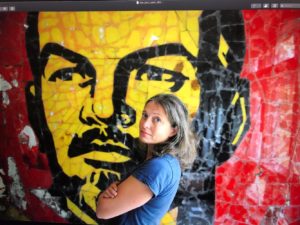
Ilze Burkovska Jacobsen
Beata Bruggeman-Sękowska: I watched fragments of your almost 80 minute animated documentary based on your life ’’My favourite War’’ and it moved me deeply. It stirred the memories from the communist oppression times, like the notion of the split-identity, who to trust, what is true. Sometimes I even had a revelation: ‘’Oh, yes, I recall it. It really happened. It was not just a bad dream.’’ Tell us in short what the story is about?
Ilze Burkovska Jacobsen: The narrative of “My Favorite War” follows my childhood and school years until the collapse of the Soviet Union. The film is about finding your own truth and identity beneath the state propaganda. It is about getting wiser, about understanding how you can learn to think independently. I sensed very early in my childhood that there was one truth about what the reality is at home and something different, some other reality, outside the home, in the official society. So the film is about the process how to become one person without double identities and lies to yourself.
Why do you call it your ‘’favourite’’ war?
There are two explanations of the title. The first and main one is to provoke and make the spectator think, that it is not possible to like something about war, and to have “war” as a favorite. This provocation gives me a chance to explain that I am making an anti-war film.
The second aspect with the title is that it mirrors a real paradox of the favorites from my childhood. The Polish TV series “4 tankmen and a dog” (1966 – 1970) was my favorite TV show. “4 Tankmen and a dog” told about WW2, and by the light approach to the war it was easy to like it for me as a child. For me it was an exciting story about friendship under serious circumstances. There was a beautiful nurse and a love story, and of course a dog! And we knew that the good ones will win at the end.
Why did you decide to create ‘’My favourite War’’? What is the purpose of it? What do you want to achieve with it?
I decided to make “My Favorite War” because I wanted to talk about this feeling being squeezed between two sides, two parts, duplicity, and a way out of this pressure. For me as a person it was a situation while I was growing up. For Latvia, as a country, it has been a painful history because of our geographical position – always in between. Between the large powers in their conflicts and interests. And I wanted to tell that there is hope. Even one person can make changes, like little Ilze in the film. And the three Baltic republics. We won without the violence against the military superpower – Soviet Union.
Nobody was spared under communism, even little children were brainwashed, were confronted with propaganda, aggression, fear. Children were supposed to ‘’trust’’ only the Party and not their family…I recall the scene from your film where the little girl on a stormy weather saves her family in a boat by hanging red sail. This little girl from your story discovers communism, what does she think, what challenges she faces, does she know what is real and what is indoctrination? What is her compass?
Thank you very much for this question! In the film the scene with the little girl raising the red sail in her vision is about her plan to save her mother from the depression: “if I become a god pioneer, a model student, the my mother will smile again”, she believes. The trickiest part of the totalitarian ideology is this subtle conviction of the children that you become a good person by joining this organization of young communists. That you are on the side of the good-ones and you do only good work. My ideological compass at that time wasn’t clear, I would call it more confused than certain, but that belief, that I´m just doing honest work as a pioneer by collecting paper for recirculation, or herbs for the pharmacies, it was again a sly cover for the manipulative ideology under these practical competitions.
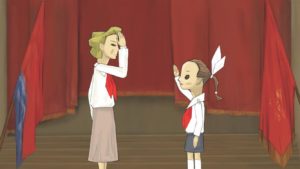
Screen photo from ”My favourite war”.
Ideological conflicts were part of your family. Tell us more about your grandfather and your parents. And could you really make choices under totalitarian system?
In 1949 my mother`s father was sentenced for 25 years in Gulag. They – the power – didn’t need any particular reason, the case was made up. My grandfather owned a medium size farm and that was enough. In the process of confiscation of the land and the forced collectivization, the soviet rule just sent thousands of Baltic farmers to Siberia, my Grandfather was one of them. He survived and returned home 3 years after Stalin’s death.
My Father came from a very Latvian patriotic family too, but when he started to work he was spotted out as a special talent in leadership. My Father loved people, he motivated them to do their best. The Communist Party needed people like him. My Father died at a very young age and I can`t ask any questions to him any more. And I want people to watch my film to get the whole story from my perspective today. But, yes, the process of the scriptwriting for “My Favorite War” was enormously hard because of these questions about my father. What did he believe in? Why did he agree to be in the Party? Everybody whom I met of his previous colleagues remembers him like a ray of light in the dark times, so the only thing I understood was – he needed this protective shield of the Communist Party to be able to improve life for other people.
I don’t recall any arguing between my father and grandfather. The tough conflict in family came up when my mother was given an ultimatum at her work place in early 80`s: join the Communist Party or lose your job. That was tough. I have a feeling that one of my mother`s brothers still hasn’t forgiven her that she joined the party.
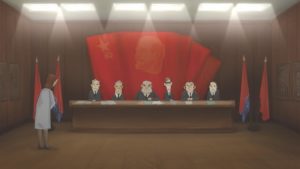
Screen photo from ”My favourite war”.
Communist oppression influenced deeply your life, your family life and people around you.
The deepest influence of the regime in my life personally is this feeling of double identities, and the wish to be one person, not two. Like one at home and the other one when among the strangers. I was 5 years old when my grandmother taught me the national anthem of the Latvian Republic, the anthem which we have now, and which was the anthem until the soviet occupation. That is a short song, “God, bless Latvia”, I learned it quickly and at the same time I felt it was a very powerful song. Grandmother taught me to play it with one finger on the piano too. And then I was told never to play or sing it outside her house. Because this song is forbidden and my family would be arrested if somebody discovered that we appreciated the old anthem.
Then we have a map. That is a map of the Latvian Republic, printed in 1937 in the size approx 70 cm x 1m. The paper is glued on the piece of linen so it is possible to fold the map together. My Mom kept this map behind the clothes in her wardrobe. It was strictly forbidden for me to tell my friend about this map or show it to anybody. Because it was a real proof that an independent Latvia had existed. There was a border to Soviet Union on this map, Latvia wasn’t a part of the Soviet Union. It is a typical tourist map of that time, with colorful drawings and funny people figures. I loved to watch those drawings. So I had those strange, silent moments for myself after school, alone in the flat, sneaking to mothers wardrobe, taking out this map, folding out and looking at it. Then hoping that my Mom will not notice that I have dragged out the map from the wardrobe.
In 1983 my Mom was not allowed to be a part of the tourist group going to the DDR. Because of my Grandfather. The first trip abroad for my Mother was after Latvia gained the freedom again, was a trip to Norway.
My Mother’s oldest brother was not allowed to study at a University because he was a son of the enemy of the state. Her next oldest brother was allowed to study in evenings, but the third brother could study in daytime.
My Grandfather listened to the forbidden radio “Voice of America” in particular times when they broadcasted in Latvian. Then I had to stand by the window and watch the road to the house. If suddenly some stranger would appear, I had to warn my Grandfather.
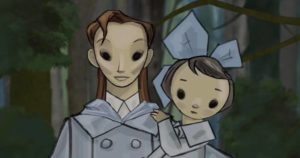
Screen photo from ”My favourite war”.
Fear. This is the main ingredient of each totalitarian system. When do you stop being afraid?
I stopped being afraid when I was approximately 15. Because I didn’t anymore feel responsible if my mother is happy or not about me being a model student. I went to Riga to attend protest demonstrations, and participated in the protests in my little town too. It was an exciting, joyful time, I shared enthusiasm with my friends, and I didn’t think much about the militia, arrests or not being able to study in my future, because the movement for withdrawing from the Soviet Union was getting larger and larger. I didn’t feel particularly brave, I just felt uplifted and alive.
How did you get prepared for your film? Is it based only on your memories, conversations with older family members or did you use some archive material?
In the film I tell my personal story of growing up from 1974 to 1990. But I use also a historical material with the witness stories from WW2. I did my own interviews, and I listened to the archive material in Latvian Occupation museum. It the film there are 5 such memory stories from the war.
Was the preparation of the documentary sometimes emotionally confronting? And why? What was the most difficult part of producing the film?
I used very long time to admit to myself that I’m making an autobiography. I felt uncomfortable with this thought. Kind of egoistic and unsympathetic. But then I settled with that and concluded that I am actually not able to ask tough questions to others, so better ask them to myself.
The most difficult part was to finish the script. To balance the personal pain from the past and make it relevant in the political context of today.
And then, as always – the last stages of financing. While the national film institutes of Norway and Latvia believed in my film and have given a main and fundamental support, it has been difficult to get international financing.
Why have you chosen for this specific form: animated documentary and whose illustrations is it based on?
Animation is based on the concept work of the Norwegian illustrator Svein Nyhus. All the drawings are made by Latvian artists Krisjanis Abols, Laima Puntule and Harijs Grundmanis.
There are many things that is not possible to get any footage or archive material from. Like soviet military bases, military objects or the defilement of the German cemetery by the soviet rule in my town. There is no visual footage of these things so I had to make it animated. And then, the other aspect of the style of the archives. The official footage of state film archives doesn’t have visuals of people’s real feelings from that time. Just the proven, accepted faces by the ruling regime. The true emotions and reactions, for example, to the ideological ceremonies are difficult to find in the archive
What are your plans concerning ‘’My favourite War’’ and further artistic plans?
The goal is to get as broad audience as possible for the film. My plans concerning “My Favorite War” is to send the film to as many festivals as possible both in documentary and animation genres, and to find a sales agent for the film. My plans as a director for the future is to make more animation, I`m planning a new animated feature film for children.
How would you define communism you experienced?
I don’t know if it was communism what I experienced. It was a state ruled by communists, so I guess I lived in the regime which could be called “communism”, since they decided over our lives. If I should use just some adjectives to characterize my emotional memory of that time in the political sense, I would use words: unjust, insecure, stagnative. I felt life was very hierarchical. But I think the worst part, would be not being able to trust other people.
Since I was a little girl, born in communist Poland I was always wondering how it is possible that totalitarian systems existed and I dreamt of freedom in all its forms, including freedom of opinion and expression. I have a feeling that you struggled with the same question. What is your answer and how we can prevent it from happening again that totalitarian practices will take over again.
It is a complex question and I don’t have a simple answer. I’m concerned that people are very segregated from each other again. There are so many sources of information and people live in different “bubbles”. I’m scared of the manipulation of the voters in the elections and referendums in the countries which we used to consider as stable democracies.
My own answer is to keep on sharing the stories of kindness, humanity and compassion. To keep us be able to feel emphatic.
What is freedom for you?
Freedom for me, as the first picture from the childish dream is – to smile and not to be ashamed of your own smile. Then there is more. Freedom is not to censor my own thoughts before they are expressed and the ability to express my thoughts also is freedom. Freedom is to be able to move and travel, and freedom is responsibility. Responsibility which you make as your own voluntary tribute to the society, not as a commanded inmate.
Is there any message you would like to share with our audience?
I would like to share two thoughts. The first – democracy is an ongoing process. We should not take it for granted. There always will be forces who would like to rule by the opposite of the “liberté, égalité, fraternité” ideals. The second. It is very important to communicate with our stories and experiences. Because we live now in a very fragmented, segmented and polarized times.
Photos: with permission of Ilze Burkovska Jacobsen . © Copyright Ilze Burkovska Jacobsen, 2019. All rights
Interview: © Copyright www.communications-unlimited.nl, 2019. All rights reserved
source: Central and Eastern Europe Center Communications-Unlimited.nl: https://www.communications-unlimited.nl/how-to-become-one-person-without-double-identities-and-lies-to-yourself/
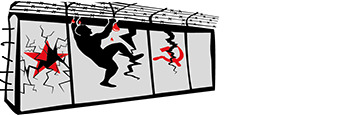
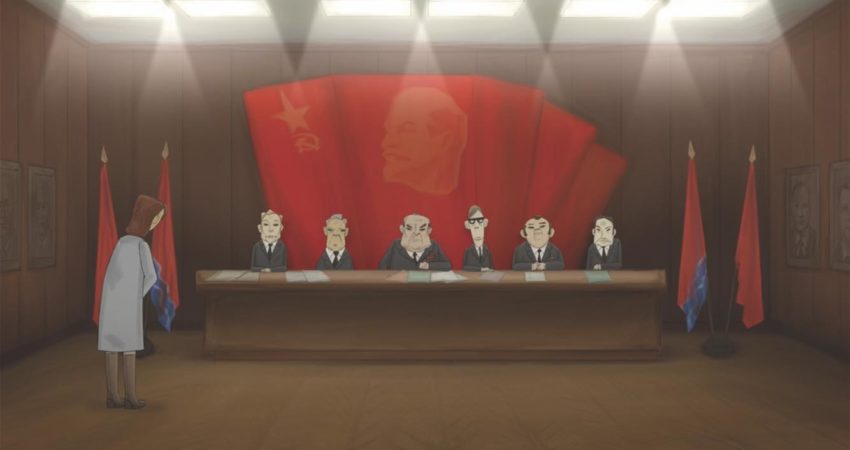
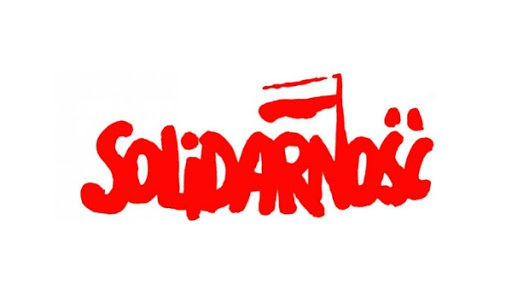
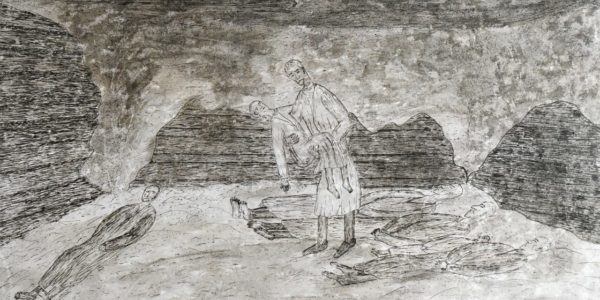
Follow Us!